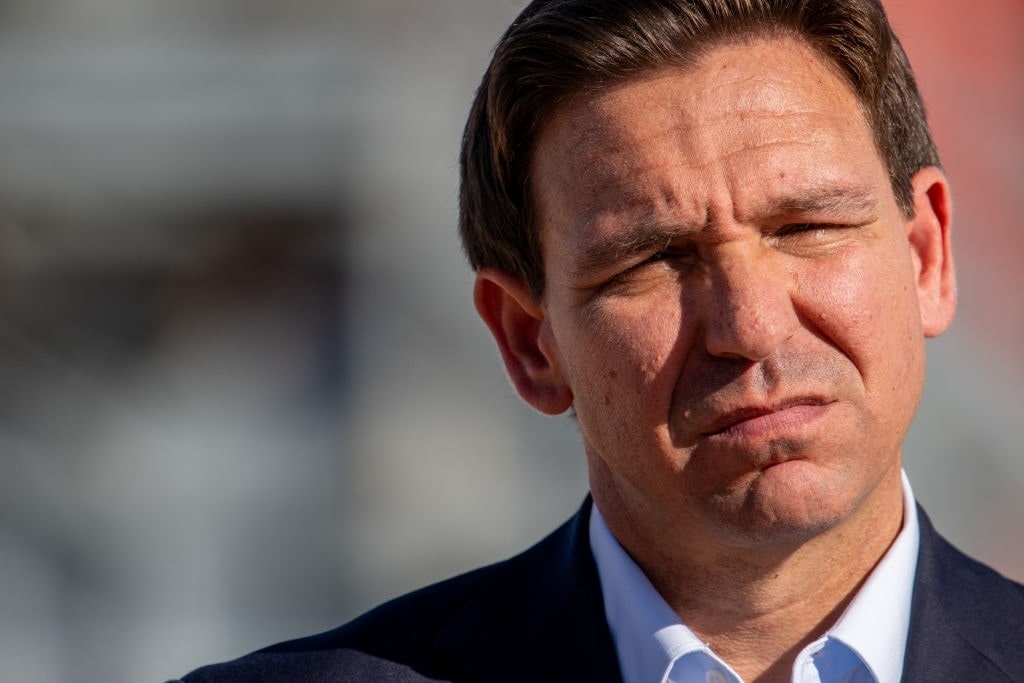It’s been said that it is better to have loved and lost than never to have loved at all. While that may be true in romance, it most definitely is not in politics, where defeat inevitably tarnishes even the most sterling reputations. That said, and hindsight being 20-20, one-time rising star Ron DeSantis might well be regretting his decision to run for president in 2024. And if he isn’t, he probably should.
It is understandable he would seek the biggest prize of all, having just won a landslide victory in Florida and presenting as the newest, shiniest object on the right, widely presumed to be the heir apparent to the still towering but legally entrapped Donald Trump. He was, and perhaps still is, the Republican who Democrats were said to fear the most. It seemed the smart thing to follow a cardinal rule of politics, to strike while the iron is hot, when one’s political career had reached or approached its climax if not its zenith. How could the governor have known Trump would dominate the projected death match between the two combatants and build a virtually insurmountable lead – by getting repeatedly indicted?
DeSantis Fever Breaks
Indeed, as late as the spring of this year, few thought DeSantis’s presidential ambitions to be unwarranted. But there were always questions about his timing. Subjecting himself to the slings and arrows of Donald Trump in the 2024 race, when he could have waited until 2028 after the field was clear of Trump for the first time in a dozen years, has undoubtedly taken a toll on his exceptional reputation. If he had remained on the sidelines for 2024, he would almost certainly have been considered the default frontrunner for 2028, while carrying on with his war on woke as governor of Florida, continuing to delight the right and further strengthening his appeal for 2028.
Instead, as Trump builds a lead of mammoth proportions, and Vivek Ramaswamy and Nikki Haley draw widespread praise for their performance in the first debate and on the campaign trail, the Florida governor’s polling numbers sink into pure also-ran territory even as he clings to a distant second place nationally. Despite delivering detailed and far-reaching policy pronouncements such as his recent plan for achieving energy dominance (not just independence), he has been accused in some circles of being excessively harsh, unrelatable, and not at his best when not in sole possession of the bully pulpit and bullhorn of a governor. In short, he has been tagged as unequal to, or unprepared for, the herculean task of running for president. Further bad news for DeSantis came in the form of a shocking poll by ABC News on September 24 showing Trump with a stunning nine-point lead over Joe Biden, a result sure to generate widespread head-spinning and only add to the growing momentum of the 45th president.
It’s Not About Money

Ron DeSantis (Photo by Brandon Bell/Getty Images)
DeSantis’s failure to launch certainly has nothing to do with money. His super PAC has lapped the field in fundraising, raking in some $97 million as of June 30, far more than any of his rivals including Trump. But paradoxically, as his campaign burned through more than $30 million in the first half of 2023, he simultaneously fell into a steeper descent than any of the other dozen candidates. As recently as March, he had attracted more than 30% support among the GOP faithful in multiple polls, narrowed Trump’s lead to single digits and even beat the former president in one CNN poll. He is now averaging 13%, according to the Real Clear Politics average. That is a whopping 17-point and 57% plunge in the space of six months. By way of comparison, in the same time period, Ramaswamy has increased his support from near-zero to 7%, Haley has risen slightly to 5%, and the rest of the field has been marching in place, remaining essentially where they started.
Reality bites even harder for DeSantis in Iowa, where he trails Trump by 34 points, and in New Hampshire, where he is in single digits and stuck in fourth place behind even protest candidate Chris Christie. Getting routed in the first two contests would unquestionably sink the DeSantis campaign. And all he will have accomplished is to be a magnet for attack from the master of the art of attack, diminishing his own reputation, eliminating himself from contention for the number two spot on the ticket, and thus bringing himself back to the pack for 2028. In fact, given that Trump has called him disloyal for having the audacity to challenge him in the GOP primary, and DeSantis has been forced to hit back, the governor has likely lost considerable ground among the Trump-only crowd as they consider who is worthy to follow in the footsteps of their man.
There was little the governor could do to reverse the overwhelming impact of Trump’s arrests, which he was forced to decry even as he raised questions about Trump’s conduct. However, the impact of his unsuccessful campaign is not limited to the presidential race. As his numbers have dropped precipitously, so has his unquestioned command of the GOP supermajority in the Sunshine State legislature which has famously served as a virtual rubber stamp for the popular and powerful governor. A recent article in Politico entitled “DeSantis’ influence nosedives in Florida,” which some might justifiably label a hit piece, Florida Republicans, from whom never was heard a discouraging word when it came to their governor, at least until recently, were surprisingly willing to open up to the author from the liberal site. Most notable was a GOP consultant who pulled no punches in declaring, “There’s no love lost between the Legislature and DeSantis. … They are faking it. They are waiting long enough to see the king drained of all his power. It’s a slow-motion coup.”
 Has DeSantis exemplified the Peter Principle, which postulates that people rise to their level of incompetence? Just because someone is an effective or powerful governor, does not mean they will become an attractive presidential candidate. History is replete with the political corpses of rising stars who stopped rising once they ran for president. In 2016 alone, Marco Rubio was the apple of the neoconservative eye, Scott Walker was a conservative hero, and Jeb Bush was declared the secure frontrunner. In 2020, many Democrats thought their savior was Sen. Elizabeth Warren (D-MA) or Kamala Harris or Michael Bloomberg. All of them raised and/or spent huge sums of money. And yet, they all failed to make a dent and either became irrelevant to the national conversation or all but disappeared from sight.
Has DeSantis exemplified the Peter Principle, which postulates that people rise to their level of incompetence? Just because someone is an effective or powerful governor, does not mean they will become an attractive presidential candidate. History is replete with the political corpses of rising stars who stopped rising once they ran for president. In 2016 alone, Marco Rubio was the apple of the neoconservative eye, Scott Walker was a conservative hero, and Jeb Bush was declared the secure frontrunner. In 2020, many Democrats thought their savior was Sen. Elizabeth Warren (D-MA) or Kamala Harris or Michael Bloomberg. All of them raised and/or spent huge sums of money. And yet, they all failed to make a dent and either became irrelevant to the national conversation or all but disappeared from sight.
If he had just waited for the towering figure of Donald Trump to leave the stage come 2028, imagine how far the DeSantis star might have risen absent the brutal attacks from Trump and the crowd of afterthought candidates vying for their measly portion of political crumbs left on the table by Trump. Facing the equivalent of a must-win debate on Wednesday – a meh performance will not do the trick – DeSantis is in desperate need of reasserting his prominence among the non-Trump field of candidates, or face the eventual reality that he will be forced to, at best, postpone his path to the White House.




